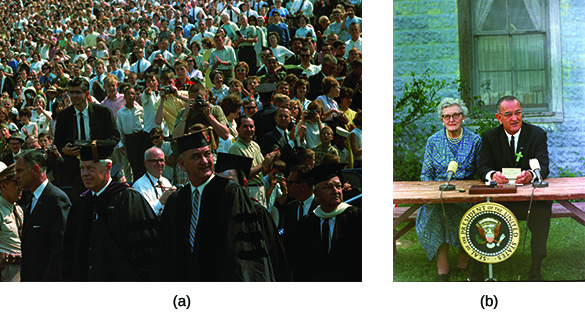| << Chapter < Page | Chapter >> Page > |
On November 27, 1963, a few days after taking the oath of office, President Johnson addressed a joint session of Congress and vowed to accomplish the goals that John F. Kennedy had set and to expand the role of the federal government in securing economic opportunity and civil rights for all. Johnson brought to his presidency a vision of a Great Society in which everyone could share in the opportunities for a better life that the United States offered, and in which the words “liberty and justice for all” would have real meaning.
In May 1964, in a speech at the University of Michigan, Lyndon Johnson described in detail his vision of the Great Society he planned to create ( [link] ). When the Eighty-Ninth Congress convened the following January, he and his supporters began their effort to turn the promise into reality. By combatting racial discrimination and attempting to eliminate poverty, the reforms of the Johnson administration changed the nation.

One of the chief pieces of legislation that Congress passed in 1965 was the Elementary and Secondary Education Act ( [link] ). Johnson, a former teacher, realized that a lack of education was the primary cause of poverty and other social problems. Educational reform was thus an important pillar of the society he hoped to build. This act provided increased federal funding to both elementary and secondary schools, allocating more than $1 billion for the purchase of books and library materials, and the creation of educational programs for disadvantaged children. The Higher Education Act , signed into law the same year, provided scholarships and low-interest loans for the poor, increased federal funding for colleges and universities, and created a corps of teachers to serve schools in impoverished areas.
Education was not the only area toward which Johnson directed his attention. Consumer protection laws were also passed that improved the safety of meat and poultry, placed warning labels on cigarette packages, required “truth in lending” by creditors, and set safety standards for motor vehicles. Funds were provided to improve public transportation and to fund high-speed mass transit. To protect the environment, the Johnson administration created laws protecting air and water quality, regulating the disposal of solid waste, preserving wilderness areas, and protecting endangered species. All of these laws fit within Johnson’s plan to make the United States a better place to live. Perhaps influenced by Kennedy’s commitment to the arts, Johnson also signed legislation creating the National Endowment for the Arts and the National Endowment for the Humanities, which provided funding for artists and scholars. The Public Broadcasting Act of 1967 authorized the creation of the private, not-for-profit Corporation for Public Broadcasting, which helped launch the Public Broadcasting Service (PBS) and National Public Radio (NPR) in 1970.

Notification Switch
Would you like to follow the 'U.s. history' conversation and receive update notifications?